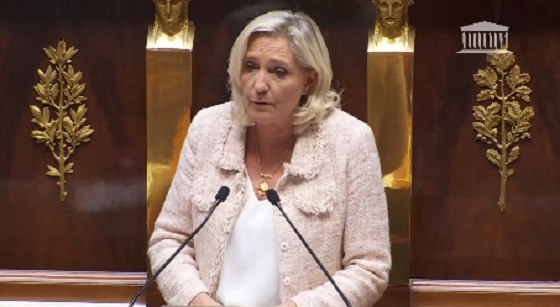Health
RFK Jr. purges CDC vaccine panel, citing decades of ‘skewed science’

From LifeSiteNews
By Robert Jones
RFK Jr.’s HHS has removed all Advisory Committee on Immunization Practices members in an effort to reset public confidence in vaccine oversight.
Health and Human Services Secretary Robert F. Kennedy Jr. has dismissed every member of the CDC’s top vaccine advisory panel, citing what he described as a “decades” of “conflicts of interest” and “skewed science” in the vaccine regulatory system.
RFK Jr.’s abrupt decision to “retire” all 17 members of the Advisory Committee on Immunization Practices (ACIP) was announced in a Wall Street Journal op-ed Monday and confirmed by HHS shortly thereafter.
The move marks the most sweeping reform to federal vaccine policy in years and follows months of internal reviews and mounting public skepticism.
Kennedy accused the ACIP of being “little more than a rubber stamp for any vaccine,” claiming “it has never recommended against a vaccine.”
“The public must know that unbiased science guides the recommendations from our health agencies,” Kennedy wrote. “This will ensure the American people receive the safest vaccines possible.”
ACIP holds the power to influence which vaccines are recommended by the CDC and covered by insurers. But according to Kennedy, it has failed in its duty to protect the public.
He cited multiple government investigations—dating back to 2000 and 2009—finding that ACIP members were routinely advising on products from pharmaceutical firms with which they had financial ties. Committee members were also issued conflict-of-interest waivers from the CDC.
Kennedy pointed to the 1997 vote approving the Rotashield vaccine – later withdrawn for causing severe bowel obstructions in infants – as a case study in regulatory failure. Four of the eight members who voted for it had financial stakes in rotavirus vaccines under development.
He explained “retiring” the 17 members, “some of whom were last-minute appointees of the Biden administration,” by saying that without such a move, “the Trump administration would not have been able to appoint a majority” until 2028.
CNBC warned the firings could “undermine vaccinations” and erode trust among scientists. But Kennedy, a longtime vaccine industry sceptic, maintains that trust has already “collapsed” – and that restoring it requires nothing less than a full reset.
Under Kennedy’s leadership, HHS has already halted recommendations for routine COVID-19 shots for healthy children and pregnant women and cancelled COVID-era programs to fast-track new vaccines.
It remains unclear who will replace the outgoing ACIP members, though HHS confirmed the committee will still meet later this month, now under new leadership.
“The new members won’t directly work for the vaccine industry,” he promised. “They will exercise independent judgment, refuse to serve as a rubber stamp, and foster a culture of critical inquiry—unafraid to ask hard questions.”
Health
Canadians left with no choice but euthanasia when care is denied

From LifeSiteNews
Ontario’s euthanasia regulators have tracked 428 cases of possible criminal violations without a single criminal charge being laid.
Once again, a government report affirmed what every Canadian should know by now: People are being killed by euthanasia because they cannot access the care they actually need and in some cases are denied that care.
The “choice” that is left to them is a lethal injection. Ontario’s Medical Assistance in Dying (MAiD) Death Review Committee’s (MDRC) latest report, “Evaluating Incurability, Irreversible Decline, and Reasonably Foreseeable Natural Death,” highlights this fact once again.
As Dr. Ramona Coelho, an advocate for people with disabilities and one of the most eloquent opponents of Canada’s MAiD regime highlighted in her analysis of the report, Health Canada dictates that a “person can only be considered incurable if there are no reasonable and effective treatments available (and) explicitly state that individuals cannot refuse all treatments to render themselves incurable, and thereby qualify for MAiD.”
However, the MDRC’s report cites cases that do not appear to qualify:
Consider Mrs. A: isolated, severely obese, depressed, and disconnected from care; she refused treatment and social support but requested MAiD. Instead of re-engaging her with care, MAiD clinicians deemed her incurable because she refused all investigations, and her life was ended.
Or Mr. B: a man with cerebral palsy in long-term care, he voluntarily stopped eating and drinking, leading to renal failure and dehydration. He was deemed eligible under Track 1 because his death was consequently considered “reasonably foreseeable.” No psychiatric expertise was consulted despite signs of psychosocial distress.
Or Mr. C: a man in his 70s with essential tremor, whose MAiD provider documented that his request was mainly driven by emotional suffering and bereavement.
In short, Coelho concludes, “Canada’s legal safeguards are failing. Federal guidelines are being ignored. The public deserves to know: Is Canada building a system that truly protects all Canadians – or one that expedites death for the vulnerable?” It has been clear what kind of system we have created for some time, which is why Canada is considered a cautionary tale even in the UK, where assisted suicide advocates violently and indignantly object to any comparisons of their proposed legislation and the Canadian regime.
The National Post also noted examples found in the MRDC’s report, noting that: “A severely obese woman in her 60s who sought euthanasia due to her ‘no longer having a will to live’ and a widower whose request to have his life ended was mainly driven by emotional distress and grief over his dead spouse are the latest cases to draw concerns that some doctors are taking an overly broad interpretation of the law.”
None of this seems to concern the federal government, much less law enforcement. Horror stories are simply not addressed, as if ignoring them means that they did not happen. Constant revelations of lawbreaking are met with silence. “A quarter of all Ontario MAiD providers may have violated the Criminal Code,” journalist Alexander Raikin warned last year in The Hub. “Does anyone care?” In fact, Ontario’s euthanasia regulators had tracked 428 cases of possible criminal violations – without a single criminal charge being laid.
“Canada’s leaders seem to regard MAiD from a strange, almost anthropological remove: as if the future of euthanasia is no more within their control than the laws of physics; as if continued expansion is not a reality the government is choosing so much as conceding,” Elaina Plott Calabro wrote in The Atlantic recently. “This is the story of an ideology in motion, of what happens when a nation enshrines a right before reckoning with the totality of its logic.”
There is an opportunity to stop the spread of Canada’s MAiD regime. MPs Tamara Jansen and Andrew Lawton are championing the “Right to Recover” Act, which would make it illegal to euthanize someone whose sole qualifying condition is mental illness. I urge each and every reader to get involved today.
Business
Health-care costs for typical Canadian family will reach over $19,000 this year
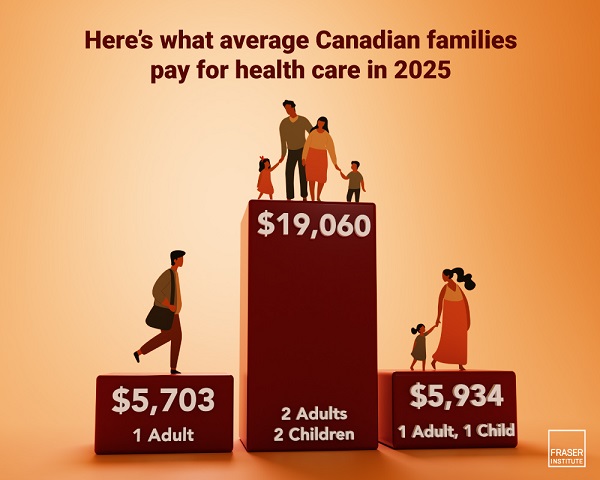
From the Fraser Institute
By Nadeem Esmail, Nathaniel Li and Milagros Palacios
A typical Canadian family of four will pay an estimated $19,060 for public health-care insurance this year, finds a new study released today by the Fraser Institute, an independent, non-partisan Canadian public policy think-tank.
“Canadians pay a substantial amount of money for health care through a variety of taxes—even if we don’t pay directly for medical services,” said Nadeem Esmail, director of health policy studies at the Fraser Institute and co-author of The Price of Public Health Care Insurance, 2025.
Most Canadians are unaware of the true cost of health care because they never see a bill for medical services, may only be aware of partial costs collected via employer health taxes and contributions (in provinces that impose them), and because general government revenue—not a dedicated tax—funds Canada’s public health-care system.
The study estimates that a typical Canadian family consisting of two parents and two children with an average household income of $188,691 will pay $19,060 for public health care this year. Couples without dependent children will pay an estimated $17,338. Single Canadians will pay $5,703 for health care insurance, and single parents with one child will pay $5,934.
Since 1997, the first year for which data is available, the cost of healthcare for the average Canadian family has increased substantially, and has risen more quickly than its income. In fact, the cost of public health care insurance for the average Canadian family increased 2.2 times as fast as the cost of food, 1.6 times as fast as the cost of housing, and 1.6 times as fast as the average income.
“Understanding how much Canadians actually pay for health care, and how much that amount has increased over time, is an important first step for taxpayers to assess the value and performance of the health-care system, and whether it’s financially sustainable,” Esmail said.
The Price of Public Health Care Insurance, 2025
- Canadians often misunderstand the true cost of our public health care system. This occurs partly because Canadians do not incur direct expenses for their use of health care, and partly because Canadians cannot readily determine the value of their contribution to public health care insurance.
- In 2025, preliminary estimates suggest the average payment for public health care insurance ranges from $5,213 to $19,060 for six common Canadian family types, depending on the type of family.
- Between 1997 and 2025, the cost of public health care insurance for the average Canadian family increased 2.2 times as fast as the cost of food, 1.6 times as fast as the average income, and 1.6 times as fast as the cost of shelter. It also increased much more rapidly than the average cost of clothing, which has fallen in recent years.
- The 10 percent of Canadian families with the lowest incomes will pay an average of about $702 for public health care insurance in 2025. The 10 percent of Canadian families who earn an average income of $88,725 will pay an average of $8,292 for public health care insurance, and the families among the top 10 percent of income earners in Canada will pay $58,853.
-

 espionage1 day ago
espionage1 day agoInside Xi’s Fifth Column: How Beijing Uses Gangsters to Wage Political Warfare in Taiwan — and the West
-
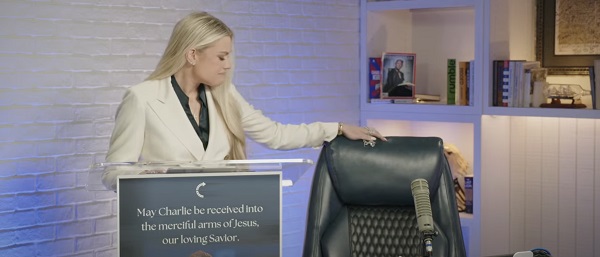
 Daily Caller2 days ago
Daily Caller2 days ago‘You Have No Idea What You Have Unleashed’: Erika Kirk Addresses Supporters For First Time Since Kirk’s Assassination
-
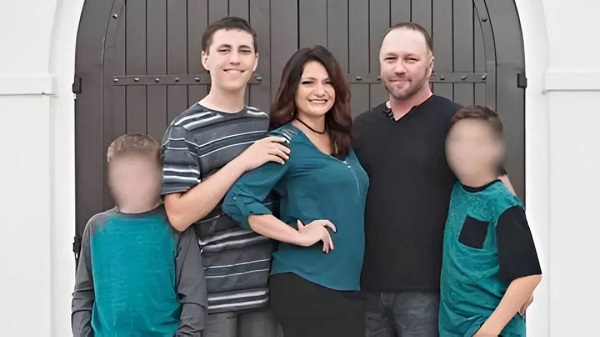
 Crime2 days ago
Crime2 days agoFormer NYPD Inspector Shares What Family Of Alleged Charlie Kirk Assassin Feared Before Turning Him In
-

 Censorship Industrial Complex1 day ago
Censorship Industrial Complex1 day agoDecision expected soon in case that challenges Alberta’s “safe spaces” law
-

 Energy20 hours ago
Energy20 hours agoTrump Admin Torpedoing Biden’s Oil And Gas Crackdown
-

 Education1 day ago
Education1 day agoOur kids are struggling to read. Phonics is the easy fix
-

 International1 day ago
International1 day agoBrazil sentences former President Bolsonaro to 27 years behind bars
-
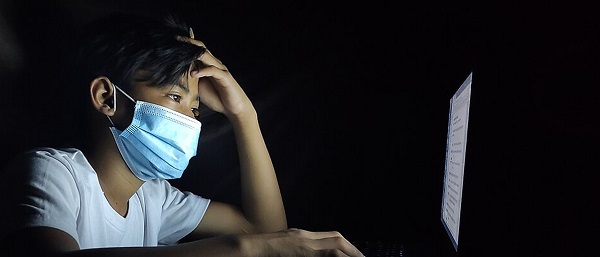
 COVID-1920 hours ago
COVID-1920 hours agoWhy FDA Was Right To Say No To COVID-19 Vaccines For Healthy Kids




